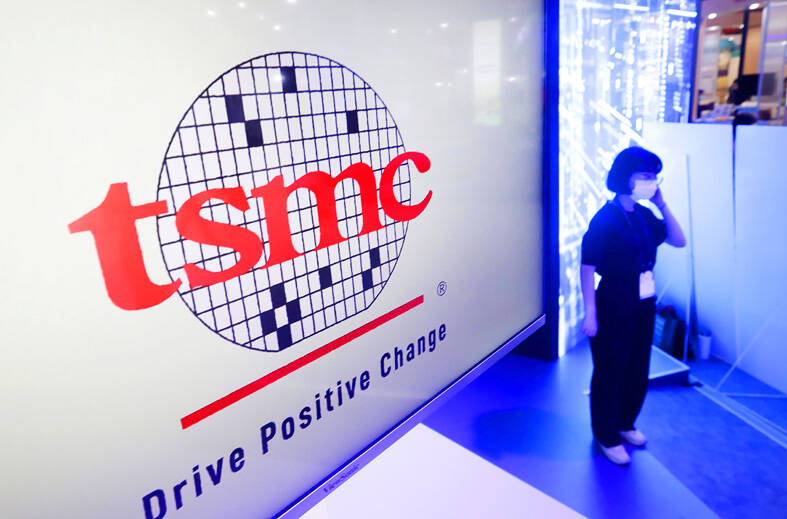Taiwan Semiconductor Manufacturing Co (TSMC, 台積電), the world’s biggest contract chipmaker, is reportedly to halt supply of artificial intelligence (AI) chips and graphics processing units (GPUs) made on 7-nanometer or more advanced process technologies from next week in order to comply with US Department of Commerce rules.
TSMC has sent e-mails to its Chinese AI customers, informing them about the suspension starting on Monday, Chinese online news outlet Ijiwei.com (愛集微) reported yesterday.
The US Department of Commerce has not formally unveiled further semiconductor measures against China yet.

Photo: Chiang Ying-ying, AP
“TSMC does not comment on market rumors. TSMC is a law-abiding company and we are committed to complying with all applicable rules and regulations, including applicable export controls,” TSMC said in an e-mail yesterday.
The chipmaker’s move came as it faces mounting pressure from the US department to comply with its semiconductor restrictions, underscoring the escalation in the China-US technology war, the report said.
Last week, TSMC stopped 7-nanometer chip shipments to China-based chip designer Sophgo Technologies Ltd (算能科技) after a chip it made was found on a Huawei Technologies Co (華為) AI chip.
The suspension of TSMC chips would deal a heavy blow to China’s AI and GPU designers and undermine their chip performance and competitive edge, the report said.
TSMC might gain greater business opportunities from the US by following the commerce department’s rules, it added.
Taiwan’s chip companies are warned to brace for stricter regulations after US president-elect Donald Trump won the election.
Trump last month accused Taiwan of “stealing” the US chip industry and threatened to levy tariffs on chips from Taiwan.
As TSMC is a major supplier of advanced chips to Nvidia Corp, Advanced Micro Devices Inc and Intel Corp, any tariff hikes could inflate electronics prices and increase US inflation, it remains to be seen whether Trump would impose sweeping or selective tariffs, Macronix International Co (旺宏) chairman Miin Wu (吳敏求) said on Thursday.
Macronix is the world’s biggest supplier of NOR flash memory chips.
To safeguard US advancements in AI technology, there is a likelihood that the US might request TSMC to produce all cutting-edge chips in the US, including the most advanced chips, given rising tension between Taiwan and China, Wu said.
Without adequate bargaining power, TSMC and the government might find it difficult to turn down the request, Wu added.
TSMC is to ramp up production of 4-nanometer chips at its first US fab in Arizona next month. The chipmaker plans to build two more advanced fabs in Arizona for the production of 2-nanometer and more advanced chips in the US.

Application-specific integrated circuit designer Faraday Technology Corp (智原) yesterday said that although revenue this quarter would decline 30 percent from last quarter, it retained its full-year forecast of revenue growth of 100 percent. The company attributed the quarterly drop to a slowdown in customers’ production of chips using Faraday’s advanced packaging technology. The company is still confident about its revenue growth this year, given its strong “design-win” — or the projects it won to help customers design their chips, Faraday president Steve Wang (王國雍) told an online earnings conference. “The design-win this year is better than we expected. We believe we will win

Intel Corp chief executive officer Lip-Bu Tan (陳立武) is expected to meet with Taiwanese suppliers next month in conjunction with the opening of the Computex Taipei trade show, supply chain sources said on Monday. The visit, the first for Tan to Taiwan since assuming his new post last month, would be aimed at enhancing Intel’s ties with suppliers in Taiwan as he attempts to help turn around the struggling US chipmaker, the sources said. Tan is to hold a banquet to celebrate Intel’s 40-year presence in Taiwan before Computex opens on May 20 and invite dozens of Taiwanese suppliers to exchange views

Chizuko Kimura has become the first female sushi chef in the world to win a Michelin star, fulfilling a promise she made to her dying husband to continue his legacy. The 54-year-old Japanese chef regained the Michelin star her late husband, Shunei Kimura, won three years ago for their Sushi Shunei restaurant in Paris. For Shunei Kimura, the star was a dream come true. However, the joy was short-lived. He died from cancer just three months later in June 2022. He was 65. The following year, the restaurant in the heart of Montmartre lost its star rating. Chizuko Kimura insisted that the new star is still down

While China’s leaders use their economic and political might to fight US President Donald Trump’s trade war “to the end,” its army of social media soldiers are embarking on a more humorous campaign online. Trump’s tariff blitz has seen Washington and Beijing impose eye-watering duties on imports from the other, fanning a standoff between the economic superpowers that has sparked global recession fears and sent markets into a tailspin. Trump says his policy is a response to years of being “ripped off” by other countries and aims to bring manufacturing to the US, forcing companies to employ US workers. However, China’s online warriors